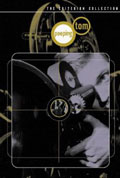
Directed by
Michael Powell
101 minutes
Rated M
Reviewed by
Bernard Hemingway


Peeping Tom
Michael Powell's extraordinary film in its day was decried as perverted and it effectively ended his career in Britain (as a result he came to Australia where he would make They're A Weird Mob (1966) and Age Of Consent (1968).
A brilliantly cast Carl Boehm, channelling Peter Lorre, plays Mark, a disturbed young man who films women as he stabs them to death with an erection-like spike connected to the tripod leg of his Bell & Howell 8mm camera, sexually-aroused by the fear that he engenders in them.
By today’s standards the violence is very low key and indeed the film as a production is quite typical of low budget fare of the period complete with plodding policeman and a nice cardigan wearing librarian (Anna Massey) as Mark’s romantic interest . What makes the film so remarkable however is its more-Hitchcockian-than-Hitchcock portrayal of mental derangement. These days it is also much admired, particularly by film theorists fed on a diet of Foucault, Deleuze et al, for its depiction of a man suffering from voyeurism or "scoptophilia" or, as we are told via a bow-tied psychologist, “the morbid desire to gaze”.
The boldness of the main idea as embodied in the script by Leo Marks (Boehm's character is called Mark Lewis) and well-realized by Powell’s economical direction continues to shock despite the datedness of the production although arguably the film’s strength has less to do with the "Peeping Tom" phenomenon as we know it than what today we call child abuse and its repercussion on adult behaviour.
Whilst Hitchcock's Psycho which wasreleased the same year, also dealt with a comparably damaged individual the treatment of psychological underpinnings of the aberrant behaviour there was much more oblique (although Norman Bates was more properly speaking, a Peeping Tom). Powell's film is a much more detailed and unflinching portrait of psychosis. And although Powell did not approach anything so graphic as Hitchcock's famous shower scene, in an unsettling move he plays the father in the home movie footage and cast his own son, Columba, as the young Mark. Whilst the autobiographical element is thus included, the film of course takes on another dimension in that we as spectators are implicated in this same "scoptophilic" phenomenon. Small wonder that the British critics went apoplectic.
Although the ending of the film is not well-handled, either technically or dramatically, and the film does at times feel a little too long, it remains a truly remarkable work in the history of British cinema.
Want something different?





